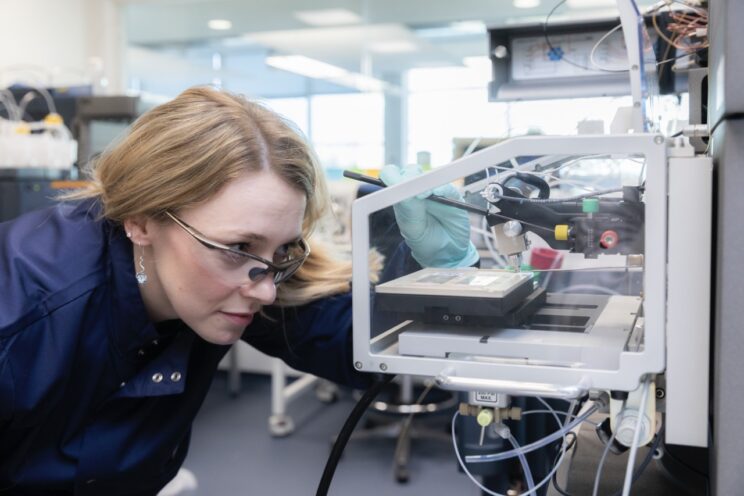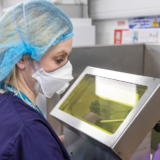Kate Bellingham, Medicines Discovery Catapult (MDC) Board Member, is championing girls’ opportunities in STEM. With a degree in Physics, an MSc in Electronics and GTP teaching qualifications, she has worked as a computer programmer, broadcast engineer, TV and radio presenter (including 4 years on BBC TV’s ‘Tomorrow’s World’), secondary school maths and physics teacher and as the National Careers Coordinator for STEM. Here she talks about the importance of addressing the gender imbalance in STEM and encourages entries for this year’s Innovate UK’s ‘Women in Innovation: Infocus Funding’ award, for women.
Two decades ago, I attended a ‘Young Engineers for Britain’ awards ceremony for school students where there was a special award for the best girl or team of girls. A colleague suggested such a prize was out-dated and possibly a bit insulting as, although there were fewer girls in the finals than boys, they were coming away with several of the ‘all comers’ prizes. My response was that until we genuinely had a level playing field for women, it was useful to raise the profile of these girls so they could be role models for the next cohort coming through.
However, I admit that I did think such awards, and the whole of the WISE Campaign, would be rendered unnecessary within a few years. In retrospect, that does seem rather naïve.
Part of my work now involves championing girls’ opportunities in engineering, and it is clear that there have been some positive changes in the past 20 years. However, the statistics show that in STEM as a whole, and particularly in the physical sciences, engineering and technology, we still have a way to go before gender is no longer an issue. Last month, I was at a meeting hosted by POWERful Women (a group which seeks to advance the professional growth and leadership development of women across the UK’s energy sector). The few men there acknowledged it felt very strange to them being in such a minority.
Last year, the Labour Force Survey showed that just 14.5 per cent of those working in STEM were women. In 2015, five per cent fewer women graduated in STEM Subjects than in 2014. But gender disparity is not just in STEM: recent reports show that women in the UK are half as likely to start a new business than men and only seven per cent of British inventors on GB patents between 2000 and 2015 were women.
Does it matter? The uproar following the recent comments by Saatchi and Saatchi boss, Kevin Roberts, and his subsequent resignation shows that gender inequality in business is still a hot topic. Many companies have recognised that addressing the lack of diversity is a business priority – it is not just about ensuring that women and those from other under-represented groups don’t miss out on career opportunities, there are measurable business benefits. And, at a time when UK plc is pushing to stay at the forefront of science research and innovation and needs to address a general skills shortage, it makes little sense to ignore half the population.
A new RBS report gives an example of the business benefits when it predicts that boosting female entrepreneurship and successfully exploiting their new ideas and technology could deliver approximately £60 billion extra to the UK economy. And for new technologies to meet the needs of the market, it makes sense that they should be developed by a population as diverse as the users. Drug discovery is a good example of this where the focus is becoming increasingly user-centric.
There are many ways those of us working in business-led innovation and STEM can help address the gender imbalance. The WISE Campaign (still very active after over 30 years) has excellent advice, starting with their ’10 Steps’ roadmap for employers. The Institute of Engineering and Technology, working with the Prospect Union, has produced ‘Progressing Women in STEM Roles’ with best practice guidance for employers. The Women’s Engineering Society’s ‘MentorSET’ programme is highly valued, but in danger of being oversubscribed, meanwhile at the POWERful Women Roundtable event, I heard of the value of both mentoring and sponsorship – the former is where the person is helped on a one-to-one basis, the latter is where the sponsor actively promotes the person’s skills and talents. Sardelis and Drew’s research article published in July 2016 entitled ‘Not “Pulling up the Ladder”’ reminds us how successful women can help those following behind avoid the same struggles they went through.
Sheryl Sandberg writes in ‘Lean In’ that Internal research at HP showed that women apply for open jobs only if they think they meet 100 percent of the criteria listed, whereas men respond to the posting if they feel they meet 60 percent of the requirements’. Regardless of the statistical accuracy in this case, most people I meet agree with this on anecdotal evidence. Is it because the women lack confidence? Is this an innate characteristic, or a result of confidence in men being seen as ‘assertiveness’, whereas in women it can be seen as being ‘bossy’?
My hobby is amateur opera and theatre, where my policy is to go ahead and audition for parts that come along, and let others decide if I’m right for the role. I could be perfectly good for it, but someone else turns up who they like better. Or I could a bit ‘left-field’ and not be what they had in mind, but, when they hear me, they could decide they like what I have to offer. No-one will laugh at me for trying – after all, any audition is good experience. I’m offering my best effort and ultimately, I am leaving someone else to make the decision.
It is in this light that I would encourage you to spread the word about Innovate UK’s ‘Women in Innovation: Infocus Funding’ award for women, and, if appropriate, to apply yourself. When looking at the list the attributes and experience, remember to hear the voice of an imaginary mentor or sponsor pointing up the positives in your ear. Or how about going and being that mentor or sponsor to a potential applicant.
The aim is to select 12 women from four different fields: manufacturing and materials, infrastructure systems, enabling and emerging technologies, and health and life sciences. They will benefit from a unique tailor-made package of support and funding and become high profile role models for the next cohort of innovative women.
And if you don’t make the final 12, at least you will have got your CV and ideas in front of some very influential people, so who knows where it could lead. The deadline for registration is noon on 24 August 2016.
By Kate Bellingham.




